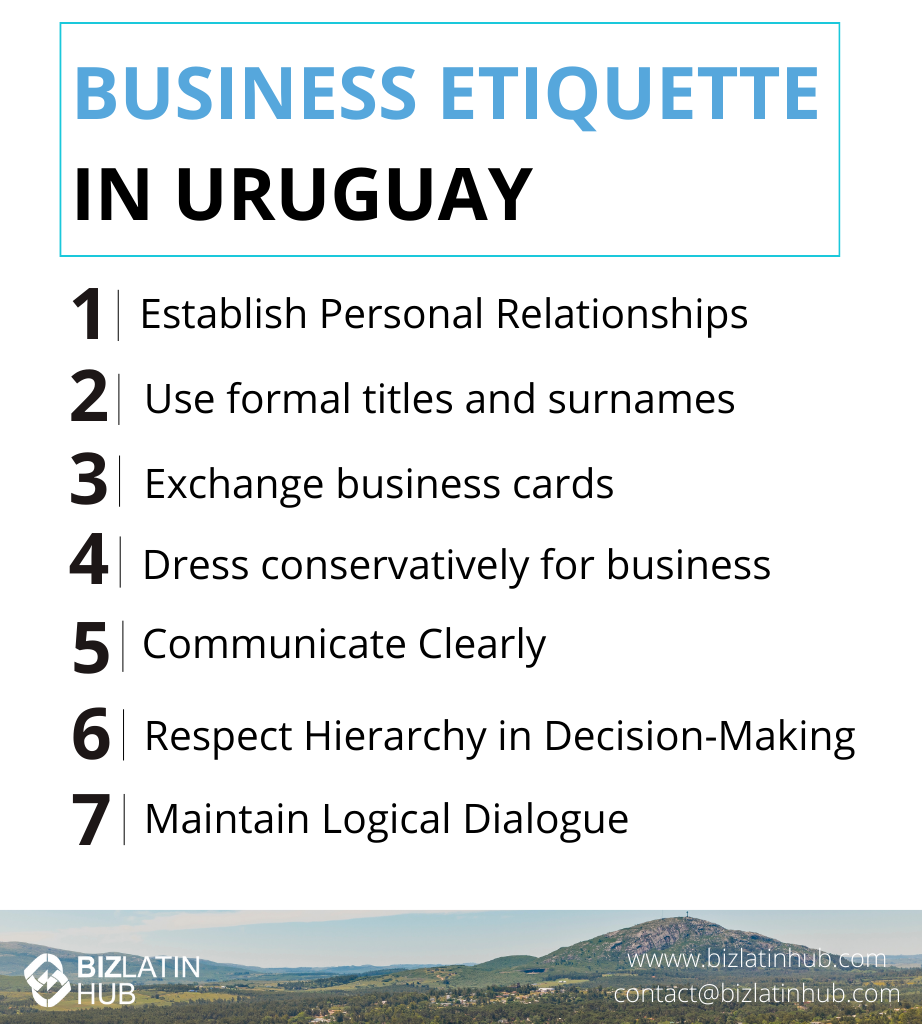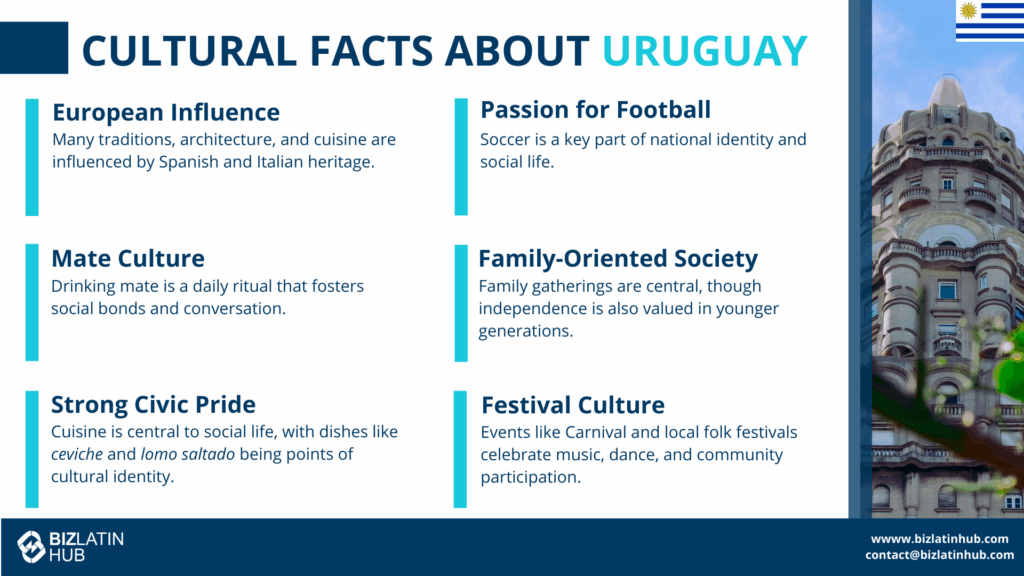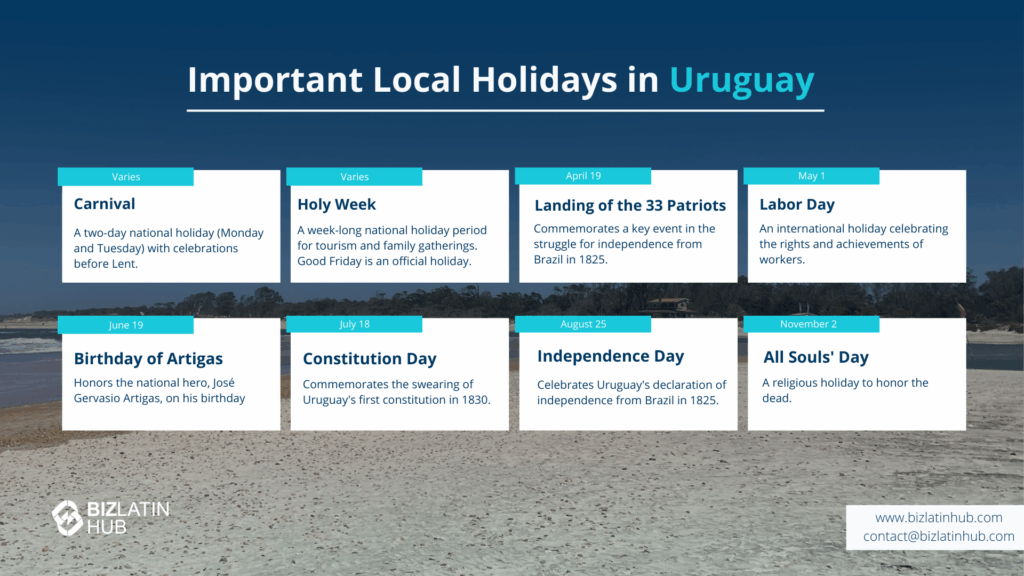Success in Uruguay’s business environment requires market knowledge. Understanding Uruguay’s specific business etiquette is also very important. This etiquette comes from Uruguay’s distinct cultural practices. It helps build positive business relationships.
From our experience working with clients in Montevideo and beyond, Biz Latin Hub provides key insights into the professional customs that shape business in Uruguay.
Language and communication style are key in these interactions. Basic Spanish is very useful. Understanding relationship-focused communication is also helpful. Reading non-verbal cues is important too. Cultural practices like punctuality, ‘sobremesa,’ and sharing mate also shape business interactions. These practices are significant.
This article offers a direct guide to Uruguay’s business etiquette. You will learn about dress codes and meeting customs. You will also learn about dining norms and the importance of mate. The article gives tips for building relationships while respecting traditions. This knowledge will help you engage effectively in Uruguay’s business scene.
Understanding the Uruguayan Business Scene
Uruguay has formal business etiquette. Respect and proper titles are very important. Always use surnames in business settings. Exchange business cards at the start of meetings. Having one side of the card in Spanish is a good idea.
Uruguayans are conservative in both dress and demeanor. Avoid flashy displays or exaggerated claims. Suits in neutral colors are preferred for men, and women should wear professional, understated attire. Politeness and humility are respected. Loud or boastful behavior may be viewed negatively.

Dress smartly and conservatively. This shows professionalism and respect. The culture is progressive. Women generally find equal respect in business.
Spanish is the official language. Many professionals also speak English. Interpreters often help in meetings to ensure clear communication.
Key points to remember:
- Use formal titles and surnames.
- Exchange business cards. A Spanish translation is helpful.
- Dress conservatively for business.
- English is spoken. Use interpreters for clarity if needed.
Understanding these points will help you in Uruguay’s business environment.
Language and Communication
Effective communication is basic in Uruguayan business. Spanish is the main language. English is common in business circles. Interpreters can assist in meetings. This ensures everyone understands. Uruguayan business culture values dealing with peers of similar status. Clear communication is essential in talks. Non-verbal elements like friendly handshakes greatly affect business interactions.
Direct eye contact is usually valued after an interaction begins. It shows sincerity. Exchanging business cards at meetings’ start is standard. Examining cards shows respect for the other person. Uruguayan professionals are typically reserved and diplomatic.
Communication is subtle and intentional. Avoid high-pressure tactics or confrontation, and focus on clarity and long-term thinking. Expect thoughtful responses. Immediate answers may be uncommon—this reflects thorough consideration, not disinterest.
Importance of Basic Spanish
Learning basic Spanish shows respect for Uruguay’s culture. Many executives speak English. Using Spanish in business talks strengthens relationships. A good understanding of Spanish improves business in Uruguay. It shows your effort to embrace Uruguayan culture. It signals a commitment to understand the local way of life. Using common Spanish phrases can make a positive impact, even if executives understand English.
Relationship-Centered Communication
Uruguay’s business culture focuses on relationships. Building and using networks is very important. Face-to-face meetings are preferred over phone or written communication. They are more personal. Newcomers should wait for formal introductions. Then they can engage with new associates. Strong personal connections are highly valued. Genuine relationships can greatly influence business matters. Greeting practices include direct eye contact (once acquainted) and a smile. These underscore personal connections.
Non-Verbal Cues and Their Significance
Non-verbal cues greatly influence Uruguay’s business interactions. Body language and gestures often affect talk outcomes. Personal space in Uruguay might be closer than in other business cultures. Backing away can seem unfriendly. Touch is common. Arm or shoulder touches during conversation are often signs of rapport. Be aware that some gestures have different meanings. For example, the “OK” hand signal (thumb and forefinger forming a circle) is offensive. You should avoid it. Understanding these non-verbal signals helps build rapport. It also helps convey messages well.
Key Cultural Nuances
Personal connections are very important in Uruguayan business. Face-to-face interactions are preferred over emails or phone calls. This preference shows the value of personal relationships. Hierarchy is significant. Respect is given to senior members. Business attire in Uruguay is conservative. People dress in a polished way. They often use classic accessories. A handshake is a typical business greeting. Friends and closer acquaintances might greet with a hug or a light kiss on the cheek. Scheduling business meetings one to two weeks early is polite. It shows respect for everyone involved.
Punctuality and Flexibility
Punctuality is important for Uruguayan business meetings. You should arrive on time. Social events, however, often have a flexible schedule. Guests commonly arrive 30 minutes to an hour late for social events. Newcomers should aim for punctuality in all settings at first. They can observe and adapt to local customs for social gatherings later. Punctuality standards differ across Latin America. Uruguayan business culture generally has formal expectations for meetings. Virtual meetings in Uruguay usually follow international punctuality standards. Scheduling face-to-face business meetings weeks early is polite. This action shows respect and good planning.
| Context | Expected Punctuality in Uruguay | Notes / Comparisons |
| Business Meetings | On time | Standard expectation |
| Social Events | 30-60 minutes late is common | Adapt to local customs |
| Virtual Meetings | Aligns with U.S. standards | Follows international norms |
| Scheduling Meetings | Weeks in advance | Shows respect and good planning |
‘Sobremesa’ and Business Discussions
Sobremesa is a valued tradition in Uruguay. It is the time spent talking at the table after a meal. These gatherings emphasize social interactions. They are a key part of building relationships. During sobremesa, meals are unhurried. They offer a chance to connect personally. They also help understand Uruguayan culture better. Business talks during sobremesa are usually informal, if they happen. The main focus is strengthening relationships, not direct talks. Participating in sobremesa shows appreciation for Uruguayan social customs. It shows a willingness to join the local culture. This practice can greatly help form long-term business relationships.
Ritual of Drinking Mate
Mate (MAH-tay) is an important drink in Uruguay. It is a social ritual. It symbolizes friendship and community. Many Uruguayans drink this traditional caffeine-rich beverage daily. It is made from yerba mate plant leaves. People often carry mate in a thermos and a special gourd.
Key parts of the mate ritual:
- Sharing: People typically share mate from one gourd (mate). They use a metal straw (bombilla) with a filter.
- The Cebador/a (Server): One person, the cebador/a, prepares and serves the mate. This person usually drinks the first infusion. The first one can be strong or bitter. This is a courtesy.
- The Round: The cebador/a refills the gourd with hot (not boiling) water. They pass it to the next person, usually to their right. Each person drinks all the mate in the gourd. A slurping sound means it is empty. They return the gourd to the cebador/a. The cebador/a refills it for the next person.
- Etiquette:
- Do not touch or move the bombilla.
- Drink the whole serving when it is your turn.
- Say “gracias” (thank you) to the cebador/a only when you want no more mate. Returning the gourd without speaking means you want another round.
- Social Importance: Sharing mate is an act of hospitality and trust. An invitation to share mate is a sign of acceptance and friendship. It is less common in very formal first business meetings. It might happen in established relationships or informal business settings. Observing or participating respectfully can greatly improve rapport.
Understanding and respecting the mate ritual shows cultural sensitivity. This is true even if you do not drink it.

Dress Code and Professional Appearance
Uruguayan business attire is mainly conservative. Professionals usually dress in a polished, smart way. This preference shows the general cultural liking for neatness. This applies to both professional and casual settings. Wearing appropriate clothes is very important when interacting with business colleagues in Uruguay. It shows respect. It also helps make a positive impression. Classic accessories often complete the look. They add personal style while keeping a reserved, professional manner. Men typically wear a suit and tie for formal business. This emphasizes formality, even in slightly relaxed settings.
Formal Business Attire
Formal attire is essential in Uruguayan business settings. A suit for men (often dark and conservative) is a good choice. Smart conservative clothing, like a business suit or elegant dress for women, is also a good choice. Business colleagues receive this approach well. It fits Uruguay’s traditional business etiquette. Dressing appropriately shows respect in the formal business environment. Hierarchy is important in Uruguay. Showing respect to senior members is standard. A conservative appearance helps show this respect. It reflects society’s traditional views on business relations. Professionals should choose clothes that maintain a polished look. Formal business interactions highly value formality. Business attire and personal presentation say a lot in Uruguay.
Business Meeting Etiquette
Business meeting etiquette in Uruguay focuses on formality and respect. Business cards are very important. People exchange them at the start of meetings. It is standard to look at each card briefly as a courtesy. Then, put it away. Formal attire, like suits or smart conservative clothing, is expected.
Greetings have a protocol. A handshake, direct eye contact (once acquainted), and a smile are part of it. This is especially true when acknowledging the highest-ranking person. Use titles (e.g., Doctor, Ingeniero, or Señor/Señora/Señorita) and surnames. Wait for permission to use first names. Trying to speak Spanish, even a little, is appreciated.
Meetings are structured, with a preference for logic and detailed discussion. Progress can be slow but deliberate. Don’t expect fast commitments—trust and due process come first. It’s not unusual for multiple meetings to occur before formal agreements are made.
Greeting Norms
Greeting norms in Uruguay show respect for hierarchy. When entering a meeting, greet the highest-ranking person first. Use a firm handshake, direct eye contact, and a warm smile. Newcomers should wait for introductions. Then they can engage with others.
Use a handshake and formal address for first meetings. Maintain eye contact and a respectful tone. Once rapport is built, a cheek kiss between men and women may occur in informal settings. In Montevideo, first impressions matter—a warm, professional greeting can set the tone for a long-term relationship.
Physical distance in conversation is generally closer than in some other cultures. Touching an arm or shoulder during conversation is common. It usually shows friendliness or emphasis. Maintain formality by using titles and surnames. Wait for an explicit invitation to use first names. These practices ensure respectful business interaction.
Importance of Business Cards
Business cards have great importance in Uruguayan business culture. Exchanging these cards at the start of meetings is essential. Taking a moment to look at each card before putting it away shows respect. Having Spanish translations on one side of the card is a good idea. It shows practicality and cultural consideration. This formality shows preparedness. It also shows understanding of Uruguay’s business etiquette.
Negotiation Styles
Negotiation styles in Uruguay follow structured hierarchies. People commonly negotiate with peers of similar status. Company leaders usually make decisions. This shows a top-down approach. The negotiation process can be slow because of this. Bureaucratic layers and the need for senior approval also slow it down. Meetings are often for discussion and idea exchange. They are not for immediate decisions. Uruguayans generally avoid direct confrontation. Public disagreement is rare. This can sometimes cause misunderstandings. Silence or polite nods might be mistaken for full agreement. Ensuring clarity and understanding the context is key for effective talks. Patience and a focus on relationship-building are very important.
Dining Etiquette
Dining in Uruguay is a valued experience. It often focuses on social connection. Punctuality is important for formal business meals. If invited to a home for a social dinner, arriving 15-30 minutes late is often fine. Bringing a small gift for the host is polite when invited to a home. Good quality chocolates, flowers (not purple or 13 of anything), or a bottle of wine are suitable.
Dinners or coffee meetings often serve as venues for relationship building. Although these occasions are informal, professional conduct should be maintained. If invited to a colleague’s home, bring a modest gift like wine or pastries. Avoid discussing business unless your host introduces the topic. For business meals, dress nicely to show respect. Business talks usually wait until after dessert or coffee. Your host might start the topic earlier. Uruguayans enjoy meals slowly. They appreciate the food and company.
Adapting to Local Customs
Understanding Uruguayan customs helps build strong business relationships. Engage with local traditions if chances arise. This shows cultural appreciation. Respect and formality are important in business settings. Use titles and surnames when addressing people. Introduce yourself with a business card at meetings. This shows respect. Start with a firm handshake in business. Choose proper attire and quality accessories. These create a good impression.
Practice of Tipping
Tipping is customary in Uruguay for many services. It is not always strictly required. People generally appreciate it as thanks for good service.
| Service Provider | Tipping Custom in Uruguay | Suggested Amount / Note |
| Restaurant Waitstaff | Customary and expected | Around 10% of the bill for good service |
| Luggage Handlers (Hotels) | Common | Around $1 (USD) or equivalent per bag |
| Hotel Housekeepers | Appreciated | Small tip left daily or at end of stay |
| Taxi Drivers | Not always expected; round up fare or leave small change | More for extra service (e.g., help with bags) |
| Tour Guides | Expected for good service | 10-15% or a set amount per person |
It is often best to tip in Uruguayan Pesos.
Building and Maintaining Relationships
Building strong relationships is key for successful business in Uruguay. Personal connections can often affect business decisions. Uruguayans value trust and rapport. This makes face-to-face meetings important. These interactions help clarify mutual expectations and goals. At a meeting, start with a handshake. Especially greet the most senior person this way to show respect. Address people formally using titles and surnames. This respect helps professional relationships. It also shows the value placed on hierarchy and order. Networking is essential in Uruguayan business culture. It is not just preferred.
Respecting Local Traditions and Norms
Respecting local traditions and norms is very important in Uruguay. Formality is appreciated. Using titles and last names is standard. This helps keep a respectful tone in business meetings. Presenting a business card at a meeting’s start shows professionalism. After getting a card, look at it for a moment. Then put it away. Dressing conservatively, like wearing suits, shows respect and seriousness. Speaking some Spanish, even a little, is good practice. It shows a willingness to understand and engage with local culture. Avoid the “OK” hand signal. It has negative meanings. Such awareness shows understanding of local customs.
Handling Sensitive Topics
Handling sensitive topics in Uruguay needs care and attention. Formality is essential during interactions. Use titles and surnames respectfully. Treat business cards with care. Look at them when you get them. This small action respects the card’s importance. Montevideo is the capital. It has a formal business tradition. This tradition mixes relationship-focused approaches with professional behavior. Appearance matters. A conservative dress code makes a good impression. Understand the local pace of business. Show flexibility. Rushing things can be unhelpful. This adaptability is part of respecting the business environment.
Showing Genuine Interest in Culture
Showing genuine interest in Uruguayan culture improves business interactions. Small talk at a meeting’s start is common. Such talks build good rapport. Safe topics include family, sports (especially football/soccer), and Uruguayan culture or sights. Be careful with political or controversial subjects. Wait for your counterpart to bring them up. Basic Spanish understanding is polite and practical. Spanish is the main language. Bringing translated Spanish materials, like business cards, shows preparation and respect. Meetings in Uruguay usually start on time. Punctuality is a sign of respect. It shows you value the other person’s time. Understanding and embracing these cultural elements makes business relationships stronger and more meaningful.

Frequently Asked Questions
What attire is expected in Uruguayan offices?
Formal attire is standard. Men wear conservative suits in dark or neutral colors. Women should opt for modest, tailored business clothing. Casual wear is not appropriate in professional environments.
What is the tone of business communication in Uruguay?
Communication tends to be understated and respectful. Assertiveness should be balanced with humility, and discussions should remain focused and logical. Avoid interrupting or pressing for quick answers.
Is business culture in Uruguay formal?
Yes. Although not rigidly hierarchical, professionalism and formal behavior are expected. Use correct titles and maintain polite, measured communication—especially in early interactions.
How are business meetings typically conducted in Uruguay?
Business meetings in Uruguay are formal and structured. Punctuality is expected. Meetings usually begin with exchanging business cards, followed by respectful greetings using titles and surnames. Decision-making can be slow due to hierarchical structures. Building personal rapport is important before negotiating.
Are business decisions made quickly in Uruguay?
No. Decisions are made carefully and often require several meetings. The process emphasizes building confidence and mutual understanding rather than rushing to outcomes.
Do Uruguayans value personal rapport in business?
Yes, though more subtly than in other Latin American countries. Building trust is essential, but it is based on professionalism, consistency, and mutual respect rather than socializing alone.
Are social invitations common in Uruguayan business culture?
They are occasional but significant. Accept invitations respectfully, and treat them as opportunities to build rapport. Bringing a small gift shows appreciation, and business topics should only be raised if initiated by your host.






